|
MAY 2001
VOL 22 No. 5
FEATURES:
Rollback: The Corporate Regulatory Feeding Frenzy
Foreward by
Monitor Staff
Bush's Corporate Cabinet
by Charlie Cray
The Repetitive Motion Un-Rule
by Deborah Weinstock
Arsenic and Old Regs
by Lynn Thorp
The Roadless Tramelled
by Ned Daly
Bankrupt Policies
by Jake Lewis
Bush’s Hot Air
by Phil Radford
Mining Their Own Business
by Charlie Cray
Defending Contractor Irresponsibility
by Robert Weissman
A Regulatory Accident in the Making
by Charlie Cray
Cheney and Halliburton: Go Where the Oil Is
by Kenny Bruno
and Jim Valette
INTERVIEW:
The Politics and Law of Worker Rights
an interview with
William Gould
DEPARTMENTS:
Behind the Lines
Editorial
Challenging the Oiligarchy
The Front
Medical Privacy, For Now
The Lawrence Summers Memorial Award
Names In the News
Resources |
Bush's Corporate Cabinet
All cabinet profiles compiled by Charlie Cray from White House press releases, news reports and financial disclosure forms filed with the U.S. Office of Government Ethics.
Bush’s Corporate Cabinet
Ann Veneman,
Secretary of Agriculture
|
| Told an agriculture conference at U. of California in 2000: “We simply will not be able to feed the world without biotechnology.” |
Until 1995, board member of Calgene (now a Monsanto subsidiary), makers of Flavr Savr genetically engineered tomato, the first biotech product to reach the market. Negotiated agricultural portions of the GATT agreement. Member, International Policy Council of Agriculture, Food and Trade (policy group financed by Monsanto, Cargill, ADM, Kraft and Nestle). Practiced law with Patton Boggs in Washington, 1993 - 1995. Clients included Dole Foods.
Board Positions: Beeline Technologies; Farm Foundation.
Recently worked as a contract partner, Nossaman, Guthner, Knox & Elliott, LLP, CA. Client list included numerous agribusiness interests.
Subappointments:
J.B. Penn, under secretary for farm and foreign agriculture services. Senior vice president of Sparks Companies, Inc.; co-founder of Economic Perspectives consulting.
Mary Waters, assistant secretary for congressional relations. Senior director for ConAgra Foods. |
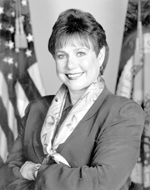 |
|
Bush’s Corporate Cabinet:
Anthony J. Principi,
Veteran Affairs Secretary |
Earned $220,000 in salary in 2000 from QTC Medical Services, and $250,000 in partnership income from Principi & McClain, law partners. Board member, Flagship Telecommunications, San Diego (8/96 - 4/00). Consultant to the Jefferson Group.
Subappointments:
Maureen Patricia Cragin, assistant secretary for public and intergovernmental affairs. Director of congressional relations for navy and marine programs at Raytheon Co.
Leo S. Mackay, Jr., deputy secretary. Vice president of Bell Helicopter Textron, Inc. for the aircraft business service unit. Ex-director of Bell-Augusta Product Support (1998-2000). |
|
Bush’s Corporate Cabinet:
John Ashcroft,
Attorney General |
Former job: Missouri Senator from 1994 to 2000.
Missouri Senator Ashcroft sponsored a bill to extend the patent on Schering-Plough’s high-profit Claritin allergy pill, then took in $50,000 campaign contribution from Schering-Plough. Other major contributors included lawyers/lobbyists, insurance, securities and investment firms and auto companies. Received nearly $2 million from various business interests versus $15,000 from labor.
Joint fundraising committee received $10,000 from Microsoft, which wants him to drop the Justice Department’s antitrust suit.
Fought hard in the Senate for Monsanto. Active abroad in convincing hesitant nations to accept genetically engineered crops; credited with persuading the British to push for European Union acceptance of Monsanto's Roundup Ready corn.
Served on the legal policy advisory board of the Washington Legal Foundation, a conservative foundation which has advanced tobacco industry positions in regulatory battles.
Subappointments:
Ralph F. Boyd, Jr., assistant attorney general for civil rights division. Partner at Goodwin Proctor law firm, Boston.
Michael Chertoff, assistant attorney general for criminal division. Partner at Latham and Watkins. |
|
Bush’s Corporate Cabinet:
Christine Whitman,
Environmental Protection Agency Administrator |
Former job: Governor of New Jersey (1993-2001), where she relaxed enforcement of pollution regulations (abolishing the state environmental prosecutor’s office and replacing the state’s public advocate with a business ombudsman), promoting voluntary compliance and cooperation instead of corporate fines. Seventy-five percent of the 3,000 NJ Department of Environmental Protection (DEP) employees surveyed in 1997 said DEP’s enforcement decreased during her tenure as governor; employees cited widespread subversion of environmental law enforcement, distortion of scientific data and suppression of information from the public.
Holdings: 853 acres of oil producing property in Jim Hogg County, Texas; Interest in Hunt Oil Co. oil wells ($50,000 to $100,000); HPD Holdings Corp (toilet bowl cleaning products, Edison, NJ) ($100,000 to $250,000); Global Household Brands, Inc. (household cleaning products) ($50,000 to $100,000).
Corporate stocks: Aventis ($31,594); Alcoa ($36,783) BP Amoco ($15,703); Chevron ($16,887); DuPont ($28,987); ExxonMobil ($150,228); Ford Motor ($36,422); Halliburton ($14,500); Lockheed Martin ($66,375); McDonald’s ($61,200); Newmont Mining ($13,275); Novartis ($28,850); Philip Morris ($17,600); Phillips Petroleum ($99,303); Proctor & Gamble ($82,750); Raytheon ($18,637); Union Carbide ($34,063); Weyerhaeuser ($10,150).
Subappointments:
Linda Fisher, EPA deputy administrator. Vice president for regulatory affairs at Monsanto, managing the company’s operations in Washington and running the company’s Political Action Committee (PAC). Worked to blunt opposition to genetically modified organisms. |
|
Bush’s Corporate Cabinet: Elaine Chao, Secretary of Labor
|
Former job: Distinguished fellow at the Heritage Foundation, a Washington-based right-wing policy group.
Although Bush said she epitomizes “the values and dreams of hard-working Americans,” she has more professional experience as an investment banker and corporate director.
Ex-vice president of Syndications BankAmerica Capital Markets Group; worked as transportation banker with Citicorp in New York; former President and CEO of United Way (1992 to 1996).
Boards: Dole Food Co., NASD (parent company of NASDAQ stock market); NADAQ; Protective Life; Vencor Inc.; Millipore; Raymond James Financial Corp.; North American Electric Reliability Council; Northwest Airlines; C.R.Bard, Inc.; Clorox; Columbia/HCA Healthcare, Parsons Co. (international construction company); Kindmark, Inc. |
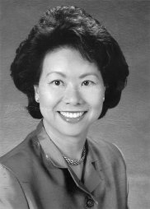 |
(online giving company; chair).
Over $50,000 in stocks: Clorox, Dole Food, HCA - The Healthcare Co., Marine Transport, Millipore, Protective Life.
Subappointments:
Shinae Chun, director of the women’s bureau. Managing director of ITR Corporation, Chicago.
Ann Laine Combs, assistant secretary. Vice president and chief counsel for pensions and retirement at the American Council of Life Insurers.
David D. Lauriski, assistant secretary for mine safety and health. President of Lauriski and Associates, mining consultants. General manager of Energy West Mining (1995 to 1999) and director of health, safety, environmental and government affairs for Interwest Mining (1993 to 1995). |
|
Bush’s Corporate Cabinet:
Donald Evans,
Secretary of Commerce
|
| Former job: Chair and CEO, Tom Brown, Inc., Denver-based oil and gas company. |
Fundraiser for Bush presidential campaign, which raised more money than any other in history.
Stocks: Over $5,000,000: Tom Brown; Over $500,000: TMBR/Sharp Drilling; Over $50,000: Halliburton, Synovus Financial, Kinder Morgan, Western Gas Resources, Vintage Petroleum, EMC Corp., Microsoft, Cisco, and Providence & Worcester Railroad.
Subappointments:
Samuel W. Bodman, deputy secretary of commerce. Chair and CEO of Cabot Corporation (world’s biggest producer of carbon black). Ex-CEO of FMR Corp. (Fidelity Investments).
Kathleen B. Cooper, under secretary for economic affairs. Chief economist and manager for economics and energy division of ExxonMobil.
Kenneth Juster, under secretary for export administration. Partner, Arnold & Porter law firm. Clients: Fannie Mae, Primedia Inc., Embassy of Israel, Bank of Estonia, Republic of Panama, and the International Chamber of Commerce Court of Arbitration. |
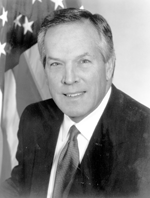 |
|
Bush’s Corporate Cabinet:
Gale Norton,
Secretary of the Interior |
Enters office from Brownstein Hyatt & Farber, P.C., a Denver-based law firm. Colorado attorney general from 1991 to 1999. Worked at the Mountain States Legal Foundation under James Watt from 1979 to 1983. The right-wing law firm is funded by Amoco, Chevron Exxon, Ford and Phillips 66.
Champion of “free-market” environmental policies, corporate environmental self-audits and (during confirmation hearings) drilling in Arctic National Wildlife Refuge. In the course of her career, she has challenged basic environmental laws including the Endangered Species Act, the Surface Mining and Reclamation Act and clean air legislation as unconstitutional. Suggested in 1991 that property owners have a "right to pollute."
National chair of the Coalition for Republican Environmental Advocates, whose steering committee includes lobbyists for the mining, auto and oil industries and which is funded by American Forest Paper Association, ARCO, American Chemistry Council and Ford.
Lobbied for NL Industries of Houston (formerly National Lead Co.), a lead paint manufacturer named as a potentially responsible party in connection with 75 Superfund sites.
Other clients include: Coors Brewing, Deytel, Global Crossing, First Colorado Depository, National Cable Television Association, New Century Energies, Tempus Resorts International, APCO Worldwide and the Alaska Legislative Council.
Assets: Wells Fargo Bank Investment Account ($100,000 to $250,000).
Boards: Independence Institute; Defenders of Property Rights.
Subappointments:
Steven Griles, deputy secretary of interior. Former lobbyist. Clients included the National Mining Association, Occidental Petroleum, Edison Electric Institute, Coalbed Methane Ad Hoc Committee, the Aluminum Association, Energy Corp. of America, Horsehead Resource Development Corp., Integrated Waste Services Association, Pennsylvania Power & Light, Reilly Industries and Tempico.
Lynn Scarlett, assistant secretary for policy, management, and budget. President of the Reason Foundation, a “wise use” think tank. |
|
Bush’s Corporate Cabinet:
Mitch Daniels,
Director, Office of
Management and Budget |
Former job: Senior Vice President, Eli Lilly
Major Assets: Eli Lilly ($5,000,000 to $25,000,000); Citigroup ($50,000 to $100,000); General Electric ($50,000 to $100,000); Merck & Co. ($50,000 to $100,000).
Boards: IPALCO Enterprises (utility); Olin Corporation; Brownstone Publishing; Bradley Foundation.
Subappointments:
Jay Lefkowitz, chief OMB counsel. Partner of Kirkland and Ellis (corporate law firm).
John D. Graham, OMB regulatory chief. Director of Harvard Center for Risk Analysis. Critics say Graham has routinely understated the dangers of products manufactured by his center’s corporate sponsors by using questionable cost-benefit analyses. Graham’s center took money from AT&T Wireless for a report that concluded that hazards of talking on a cell phone while driving are relatively small.
Writing sample: "Some suggest that because women give birth, protect and care for their children, they may naturally tend to be more nurturing than men, therefore they may be more concerned about hazards that may harm their families. ... Another possible explanation is that women are less familiar with science and technology than men, and are generally more fearful of it, especially in relation to nuclear power and chemicals." Special Report, "Women's Magazines: A Liberal Pipeline to Soccer Mom," Media Research Center, Nov. 21, 1996.
Sean O’Keefe, deputy director. Professor of business and government policy, Maxwell School, Syracuse University. Corporate boards: Tesoro Petroleum, Sensis Corp., CNS Corp., Raytheon (strategy advisory board); Northrup-Grumman Integrated Systems Sector (advisory board), J. Ray McDermott SA (energy services company). |
|
Bush’s Corporate Cabinet:
Norm Minetta,
Secretary of Transportation |
Vice president for special business initiatives, Lockheed Martin (1995 to 2000). Member, U.S. House of Representatives, D-California, 1975 to 1995. Former chair of the House Transportation Committee, where his major campaign contributors included American Trucking Association, Boeing, GE, Greyhound, Lockheed, Northwest Airlines, UPS, Union Pacific and United Airlines.
Subappointments:
Michael Jackson, deputy secretary of transportation. Lockheed Martin vice president and general manager for business development, transportation systems and services group.
Sean B. O’Hallaren, deputy secretary for government affairs. Director of Washington affairs for tax and environment, Union Pacific. |
|
Bush’s Corporate Cabinet:
Rod Paige,
Secretary of Education
|
Former job: Houston school superintendent, where he: contracted food services to Aramark; contracted payrolls to Peoplesoft; cut a deal to put Coca-Cola vending machines in school hallways; and brought in Channel One, the “educational channel” that spends two of every 12 minutes running ads for M&M/Mars, Nintendo, Pepsi and others.
Boards: Chase Bank of Texas; Greater Houston Partnership (Chamber of Commerce); National Center for Family Literacy (Toyota Families in Schools); K12.com (advisory board); America Online Education (advisory board); Texas Business and Education Coalition.
Subappointments:
Bill Hansen, deputy secretary. Executive director and CEO of Education Finance Council. |
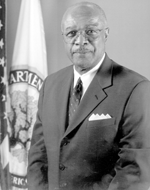 |
|
Bush’s Corporate Cabinet:
Paul H. O’Neill,
Treasury Secretary
|
| Former job: Chair and/or CEO of Alcoa; ex-CEO of International Paper. |
First said he would keep $100 million in Alcoa stock and options, giving him the largest single-company holdings of any top government official ever. Later, under pressure, reversed himself.
2000 income (including Alcoa stock options): $53 million.
Other stocks (over $500,000): International Paper, Citigroup, Dreyfus Cash Management Fund and Ganum Value Fund Keogh.
Corporate board positions: Lucent Technologies, Eastman Kodak and National Association of Securities Dealers.
Other posts: Trustee at the Rand Corporation and the American Enterprise Institute; Institute for International Economics director.
|
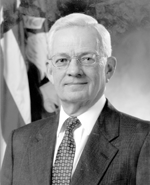 |
Subappointments:
David Aufhauser, general counsel. Partner with Williams & Connolly law firm. Clients include Bush-Cheney (Texas residency litigation), Lockheed Martin, Microstrategy, Carnival Cruise Line and Norwegian Cruise Lines (environmental lawsuits), Safety-Kleen (accounting irregularities) and American Airlines (environmental matters).
Kenneth Dam, deputy secretary. Vice president for law and external affairs, IBM.
Mark Weinberger, assistant secretary of the treasury for tax
policy. Partner at Ernst & Young. Board of Gifts In Kind International. Tax fellow at the Center for Strategic and International Studies. Stocks ($100,000 - 250,000): Citigroup, Merrill Lynch. |
|
Bush’s Corporate Cabinet: Colin Powell, Secretary of State
|
Earned $7,706,500 in speaking fees in 2000 (about $60,000 each) for 108 speeches to various corporations, including JCPenney, GE Power, Kentucky Fried Chicken, Consolidated Edison, Paine Webber, Miller Brewing, Goldman, Sachs, Wells Fargo Bank, Credit Suisse, Alex Brown & Sons, American Express, Clorox, Coca-Cola, Arthur Anderson, American Chemistry Council, Walt Disney, Twentieth Century Fox, Pillsbury, Auto Zone, Lotus and Fidelity Institutional Retirement Services.
Corporate boards: America Online; PowerUp; Gulfstream Aerospace (6/95 - 7/99).
Major stock holdings to divest include General Dynamics, Citigroup, EMC Corp., Eli Lilly, Merck & Co., Microsoft, Pfizer, America Online and others.
|
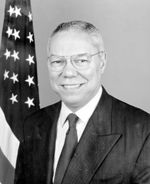 |
Subappointments:
Richard Armitage, deputy secretary of state, president of Armitage Associates, international lobbying, marketing and strategic planning consulting firm. Investigated for role in Reagan-era Iran-Contra scandal.
Corporate boards: CACI International Inc. (information technology contractor); Clean Fuels Technology, Inc. (board of advisors); Database Technologies (DBT)/ChoicePoint Inc.; General Dynamics Electronic Systems; Man Tech International (advisory board); Roy F. Weston.
Otto Reich, assistant secretary of state for western hemisphere affairs. President of RMA International Inc., lobbyists. Clients include British-American Tobacco, Bacardi and Lockheed Martin (attempted to sell F-16 fighter jets to Chile, breaking a 20-year U.S. policy). Vice-chair of apparel industry group, Worldwide Responsible Apparel Program (WRAP).
Helped write the 1996 Cuban Liberty and Democratic Solidarity Act ("Helms-Burton"), which tightens the U.S. trade embargo against Cuba in ways that could help Bacardi sue foreign competitors that do business in Cuba. During the mid-1980s, Reich headed the U.S. Office of Public Diplomacy, which carried out "prohibited, covert propaganda activities" on behalf of the contras, according to a U.S. comptroller general's report in 1987.
Walter Kansteiner, top aide on African affairs. Former commodities dealer and partner in Scowcroft Associates, where he specialized in privatization programs in Africa.
Carl W. Ford, assistant secretary of state for intelligence and research, president of Ford and Associates, a consulting firm specializing in Asia and the Middle East.
Charlotte L. Beers, under secretary of state for public diplomacy, chair of J. Walter Thompson advertising. Ex-CEO of Ogilvy & Mather (1992 to 1999). |
|
Bush’s Corporate Cabinet:
Condoleeza Rice,
National Security Adviser |
Chevron named an oil tanker after her. During the presidential campaign, advanced the claim that Bush is "someone of tremendous intellect."
Financial Assets: 250,000 shares of Chevron.
Board Positions: Charles Schwab Corp; Chevron; Transamerica; Hewlett Foundation; J.P. Morgan’s international advisory council. |
|
Bush’s Corporate Cabinet: Donald Rumsfeld, Secretary of Defense
|
Ex-CEO of General Instrument Corp. (1990-1993). Ex-CEO Searle pharmaceuticals (1977-1985).
Leading proponent of National Missile Defense [See “Star Wars, Continued,” Multinational Monitor , October 2000].
Estimated total assets between $61 million and $242.5 million. Financial disclosure report is 78 pages long (not including appendices).
Chair of Salomon Smith Barney’s international advisory board.
Directorships: Kellogg Company (7/85 - 4/99); ABB; Gulfstream Aerospace Corp. (1/93 - 9/99); Forstmann Little & Co. (5/90 - 1/00); Amylin Pharmaceutical; Gilead Sciences, Inc., chair of board; Chicago Tribune Company; OverX, Inc.; Investor AB (advisor); Metricom, Inc. (advisory board); Hamilton Group (advisory board); Transaction
Info. Systems (advisory board); Dreyfus Corp. (nine mutual fund boards); Northrop Grumman Electronic Sensors and Systems Sector (advisory board); Hasbro, Inc.
Other positions: Balkan Action Council, Bilderberg Meetings; World Economic Forum (advisor); U.S. Committee on NATO (executive board); government of Singapore (International Academic Advisory Panel); BP-Amoco (consultant); the Limited Service Corp. (consultant); Bretton Woods Committee; National Strategy Forum; Alexis de Tocqueville Institution-National Security Program; Center for Strategic and International Studies Global Organization on Crime (steering committee); Committee for Common Defense; Alfalfa Club; Bohemian Club.
Subappointments:
Pete Aldridge, undersecretary for acquisition, technology and logistics. CEO of Aerospace Corporation.
Victoria Clarke, assistant secretary of defense for public affairs. General manager of Washington office of Hill & Knowlton.
Gordon England, secretary of the Navy. General Dynamics executive.
William James Haynes, general counsel. Partner at Jenner & Bloch law firm.
James Roche, secretary of the Air Force, Northrup Grumman executive.
David S.C. Shu, under secretary for personnel and readiness. Vice president of RAND Corporation’s army research division.
Thomas White, secretary of the Army. Enron executive.
Paul Wolfowitz, deputy secretary. Received $300,000 from Hughes Electronics as co-chair of Nunn-Wolfowitz task force; Dean of Johns Hopkins U. School of Advanced International Studies. |
|
Bush’s Corporate Cabinet:
Spencer Abraham,
Secretary of Energy |
U.S. Senator from Michigan, 1994 - 2001. Sponsored Senate bill to break up the Department of Energy and privatize the federal government's power generating operations. Zero percent score from the League of Conservation Voters in both 1999 and 2000. Led the effort to defeat higher automobile fuel efficiency standards for gas-guzzling SUVs in the Senate.
Top recipient of campaign contributions from energy/natural resource executives and lobbyists in 2000 senate campaign (over $449,000). Top contributors to his 2000 Michigan Senate campaign included General Motors ($112,800); Ford Motor ($70,800); Lear Corp. ($48,900); DaimlerChrysler ($47,400); Microsoft ($37,150); Deloitte & Touche ($33,700); Citigroup ($32,750) and PricewaterhouseCoopers ($30,550).
Subappointments:
Vicki A. Bailey, assistant secretary of energy for international affairs and domestic policy. President of PSI Energy Inc. of Indianapolis.
Francis S. Blake, deputy secretary. Senior vice president of corporate business development at General Electric.
Robert Gordon Card, undersecretary. President and CEO of Kaiser-Hill Co. and ex-vice president of Ch3M Hill, Inc. |
|
Bush’s Corporate Cabinet:
Tommy Thompson,
Secretary of Health and Human Services |
Former job: Governor of Wisconsin from 1987 to 2001.
Leading Republican advocate on welfare reform and school vouchers.
Tobacco ties: $70,000 in campaign contributions between 1993 and 2000 from Philip Morris PACs and executives. Legal Policy Advisory Board of the Washington Legal Foundation, a conservative foundation which has advanced tobacco industry positions in regulatory battles. Accepted trips to Australia, South Africa, Zimbabwe and England paid for by a not-for-profit operation run by a Philip Morris vice-president. Vetoed a 10-cent increase in Wisconsin's cigarette tax in 1991. Signed the "Smokers' Rights Bill" in 1992. Vetoed legislation in 1995 requiring the new Milwaukee Brewers baseball stadium to become smoke-free in the general seating area.
Party after his confirmation was sponsored by Washington lobbying firm Kaufman Nelson Pattee, and Wisconsin corporations Harley-Davidson, Johnson Controls, 3M and Northwest Mutual Life Insurance.
Boards: Amtrak, Center for Clean Air Policy.
Subappointments:
Claude A. Allen, deputy secretary. Associate at Baker & Botts law firm (1991-1995), Washington, D.C. |
|
Bush’s Corporate Cabinet:
Robert Zoellick,
U.S. Trade Representative |
Former job: fellow at German Marshall Fund. Executive vice president, Fannie Mae, 1993-97. Served as lead State Department official in NAFTA negotiations.
Corporate-related income: Goldman Sachs & Co. (senior international advisor), $150,000; Enron, $50,000 advisory fees; Said Holdings, $60,000 director fees; Alliance Capital, $29,500 director fees.
Other boards: Jones Intercable (4/95 - 03/00); Council on Foreign Relations; Institute for International Economics (advisory committee); World Wildlife Fund (advisory council); Trilateral Commission U.S. Executive Committee; Nixon Center for Peace and Freedom (advisory board); Brookings Institution for Policy and Economic Programs (advisory committee).
Subappointments:
Jon M. Huntsman, deputy U.S. trade representative. Vice-chair of Huntsman Corporation, Utah, the largest privately held chemical business in North America.
Linnet F. Deily, deputy U.S. Trade Representative. Vice chair of Charles Schwab Corporation. Ex-CEO of First Interstate Bank of Texas. |
|
Bush’s Corporate Cabinet: Others In The Bush League
|
Andrew Card, White House Chief of Staff.
Former job: Chief lobbyist for General Motors. President of American Automobile Manufacturers Association (1993 to 1998). AAA spent $12 million on lobbying in 1997-1998, often to fight higher fuel-efficiency regulations as well as the Kyoto Protocol and other global warming initiatives. Card is a long-time Bush family supporter; worked as deputy chief of staff for Bush I administration.
On January 20, Card ordered all executive departments to postpone for 60 days the effective date of a wide range of regulations announced by President Bill Clinton in his final days.
Karl Rove, advisor to the President. Called “the governor’s Svengali” by the National Review. Philip Morris paid political intelligence operative, 1991 to 1996 (starting at $3,000/month). Shaped governor Bush’s positions on tort “reform.”
Jeanne L. Phillips, representative to OECD. Managing director of Dallas office of Public Strategies,Inc.; former president of Jeanne Johnson and Co.
John E. Robson, president of Ex-Im Bank. Senior advisor with Robertson Stephens bank.
Earl Floyed Kvamme, co-chair of President’s Committee of Advisors on Science and Technology. Partner with Kleiner Perkins Caufield and Byers, a Menlo Park California venture capital firm; former executive vice president of sales and marketing at Apple Computer.
Tom Scully, administrator of Health Care Financing Administration. President and CEO of Federation of American Hospitals.
Lawrence Lindsey, top economic advisor to the president. Arthur F. Burns chair at the American Enterprise Institute.
Diana Furchgott-Roth, staff chief to the Council of Economic Advisors. Resident fellow at the American Enterprise Institute.
Nina Rees, adviser to Vice President Cheney. Senior analyst at the Heritage Foundation.
Stephen J. Hadley, deputy director of National Security Council. Partner in Shea & Garner (representing Lockheed Martin). Lead lobbyist for development of missile defense during presidential campaign.
Michael Powell, FCC Chair. Lawyer who represented GTE (GTE merged last year with Bell Atlantic to form Verizon Commun
cations). Says he does not believe a “digital divide” is splitting U.S. society between those who have computers and Internet access and those who don’t. “I think there is a Mercedes divide … I would like to have one, but I can’t afford one.”
Kathleen Q. Abernathy, FCC Commissioner. Vice president for public policy of Broadband Office Communications. Former vice president of Air Touch Communications.
Michael J. Copps, FCC Commissioner. Former senior vice president of the American Meat Institute (1989 to 1993); director of government affairs for Collins and Aikman Corp. (1985 to 1989). Recently assistant secretary of commerce for trade development (1998 to 2001).
Nicholas Calio, White House director of legislative affairs. Lobbyist for Tenneco Automotive and Atlantic Richfield Co. Top deputy is Kirsten Ardleigh Chadwick, also formerly a registered lobbyist for Tenneco.
John Negroponte, U.S. ambassador to the United Nations. Although he has a four-decade foreign service career, he most recently served as executive vice president for global markets at McGraw-Hill. |
|
|
Mailing List Search
Editor's Blog
Archived Issues
Subscribe Online
Donate Online
Links
Send Letter to the Editor
Writers' Guidelines
HOME |





